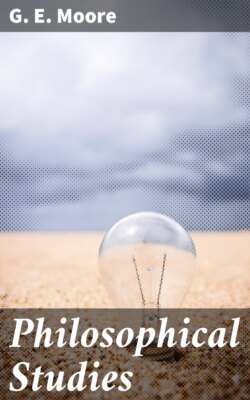Philosophical Studies

Реклама. ООО «ЛитРес», ИНН: 7719571260.
Оглавление
G. E. Moore. Philosophical Studies
Philosophical Studies
Table of Contents
PREFACE
Philosophical Studies
THE REFUTATION OF IDEALISM
THE NATURE AND REALITY OF OBJECTS OF PERCEPTION
WILLIAM JAMES
HUME'S PHILOSOPHY
THE STATUS OF SENSE-DATA
THE CONCEPTION OF REALITY
SOME JUDGMENTS OF PERCEPTION
THE CONCEPTION OF INTRINSIC VALUE
EXTERNAL AND INTERNAL RELATIONS
THE NATURE OF MORAL PHILOSOPHY
Отрывок из книги
G. E. Moore
Published by Good Press, 2019
.....
Idealists, we have seen, must assert that whatever is experienced, is necessarily so. And this doctrine they commonly express by saying that 'the object of experience is inconceivable apart from the subject.' I have hitherto been concerned with pointing out what meaning this assertion must have, if it is to be an important truth. I now propose to show that it may have an important meaning, which must be false, because it is self-contradictory.
It is a well-known fact in the history of philosophy that necessary truths in general, but especially those of which it is said that the opposite is inconceivable, have been commonly supposed to be analytic, in the sense that the proposition denying them was self-contradictory. It was in this way, commonly supposed, before Kant, that many truths could be proved by the law of contradiction alone. This is, therefore, a mistake which it is plainly easy for the best philosophers to make. Even since Kant many have continued to assert it; but I am aware that among those Idealists, who most properly deserve the name, it has become more fashionable to assert that truths are both analytic and synthetic. Now with many of their reasons for asserting this I am not concerned: it is possible that in some connexions the assertion may bear a useful and true sense. But if we understand 'analytic' in the sense just defined, namely, what is proved by the law of contradiction alone, it is plain that, if 'synthetic' means what is not proved by this alone, no truth can be both analytic and synthetic. Now it seems to me that those who do maintain truths to be both, do nevertheless maintain that they are so in this as well as in other senses. It is, indeed, extremely unlikely that so essential a part of the historical meaning of 'analytic' and 'synthetic' should have been entirely discarded, especially since we find no express recognition that it is discarded. In that case it is fair to suppose that modern Idealists have been influenced by the view that certain truths can be proved by the law of contradiction alone. I admit they also expressly declare that they can not: but this is by no means sufficient to prove that they do not also think they are; since it is very easy to hold two mutually contradictory opinions. What I suggest then is that Idealists hold the particular doctrine in question, concerning the relation of subject and object in experience, because they think it is an analytic truth in this restricted sense that it is proved by the law of contradiction alone.
.....